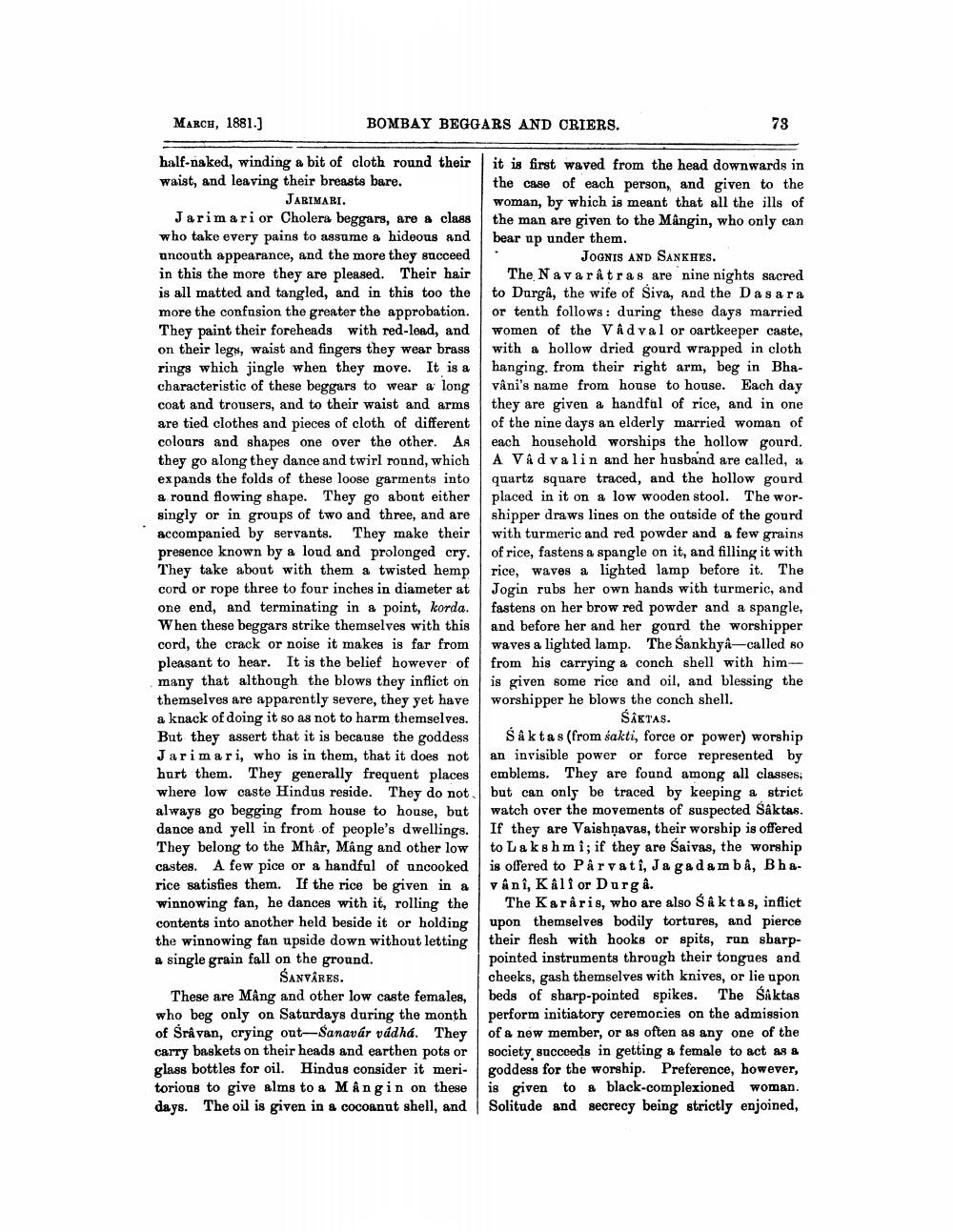________________
MARCH, 1881.)
BOMBAY BEGGARS AND CRIERS.
73
half-naked, winding a bit of cloth round their waist, and leaving their breasts bare.
JABIMARI. Jarimari or Cholera beggars, are a class who take every pains to assume a hideous and uncouth appearance, and the more they succeed in this the more they are pleased. Their hair is all matted and tangled, and in this too the more the confusion the greater the approbation. They paint their foreheads with red-lead, and on their legs, waist and fingers they wear brass rings which jingle when they move. It is a characteristic of these beggars to wear a long coat and trousers, and to their waist and arms are tied clothes and pieces of cloth of different colours and shapes one over the other. As they go along they dance and twirl round, which expands the folds of these loose garments into a round flowing shape. They go about either singly or in groups of two and three, and are accompanied by servants. They make their presence known by a loud and prolonged cry. They take about with them a twisted hemp cord or rope three to four inches in diameter at one end, and terminating in a point, korda. When these beggars strike themselves with this cord, the crack or noise it makes is far from pleasant to hear. It is the belief however of many that although the blows they inflict on themselves are apparently severe, they yet have a knack of doing it so as not to harm themselves. But they assert that it is because the goddess Jarimari, who is in them, that it does not hurt them. They generally frequent places where low caste Hindus reside. They do not always go begging from house to house, but dance and yell in front of people's dwellings. They belong to the Mhâr, Mâng and other low castes. A few pice or a handful of uncooked rice satisfies them. If the rice be given in a winnowing fan, he dances with it, rolling the contents into another held beside it or holding the winnowing fan upside down without letting a single grain fall on the ground.
SANVARES. These are Mång and other low caste females, who beg only on Saturdays during the month of Srâ van, crying out-Sanavár vádhá. They carry baskets on their heads and earthen pots or glass bottles for oil. Hindus consider it meri- torious to give alms to a MÂngin on these days. The oil is given in a cocoanut shell, and
it is first waved from the head downwards in the case of each person, and given to the woman, by which is meant that all the ills of the man are given to the Mangin, who only can bear up under them.
JOGNIS AND SANKHES. The Navaratras are nine nights sacred to Durga, the wife of Siva, and the Dasar a or tenth follows: during these days married women of the VÀdval or oartkeeper caste, with a hollow dried gourd wrapped in cloth hanging. from their right arm, beg in Bhavåni's name from house to house. Each day they are given a handful of rice, and in one of the nine days an elderly married woman of each household worships the hollow gourd. A Vid valin and her husband are called, a quartz square traced, and the hollow gourd placed in it on a low wooden stool. The worshipper draws lines on the outside of the gourd with turmeric and red powder and a few grains of rice, fastens a spangle on it, and filling it with rice, waves a lighted lamp before it. The Jogin rubs her own hands with turmeric, and fastens on her brow red powder and a spangle, and before her and her gourd the worshipper waves a lighted lamp. The Sankhya-called so from his carrying a conch shell with him is given some rice and oil, and blessing the worshipper he blows the conch shell.
SAKTAS. s Aktas (from sakti, force or power) worship an invisible power or force represented by emblems. They are found among all classes, but can only be traced by keeping a strict watch over the movements of suspected Sâktas. If they are Vaishnavas, their worship is offered to Lakshmi; if they are Saivas, the worship is offered to Parvati, Ja gada mba, Bhavânî, Káli or Durga.
The Karâris, who are also s Aktas, inflict upon themselves bodily tortures, and pierce their flesh with hooks or spits, run sharppointed instruments through their tongues and cheeks, gash themselves with knives, or lie upon beds of sharp-pointed spikes. The SAktas perform initiatory ceremocies on the admission of a new member, or as often as any one of the society succeeds in getting a female to act as a goddess for the worship. Preference, however, is given to a black-complexioned woman. Solitude and secrecy being strictly enjoined,




